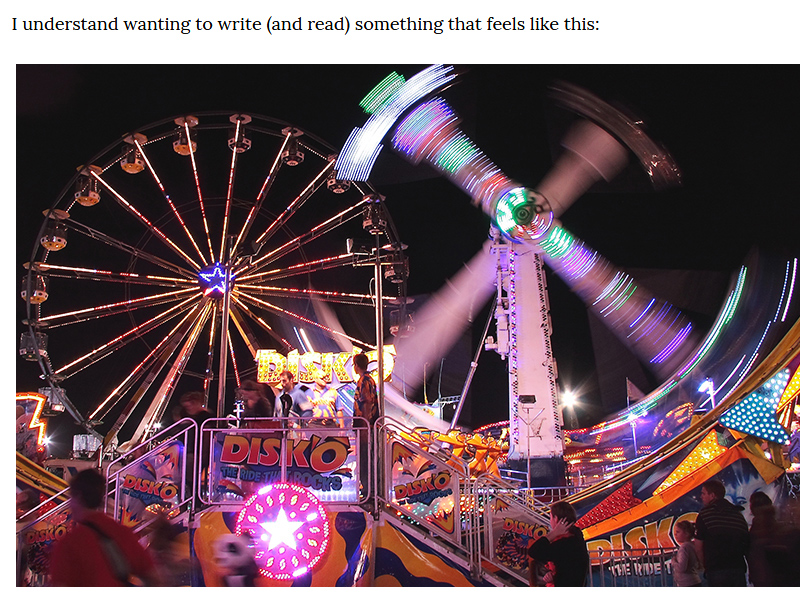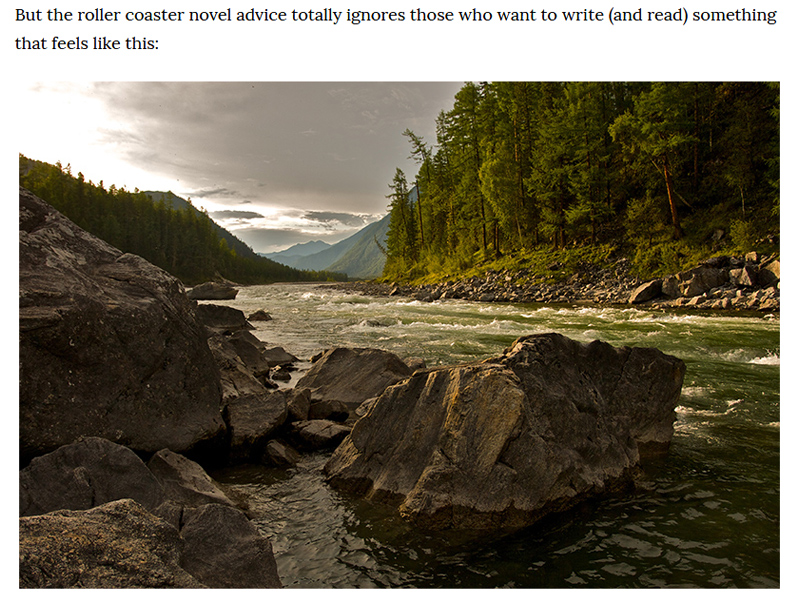
In the weeks following a short story’s release on my fiction podcast, Not About Lumberjacks, I record a short behind-the-scenes audio essay about the story.
Sometimes I focus on the mechanics of the story or what went into recording, while other times, I focus on something thematic surrounding the story.
Most recently, I spent six minutes talking about the first serious work of fiction I ever wrote, which turned into a short essay about what constitutes literary fiction for me. You can listen to it here, but I’ll share some points (and probably expand on them) in this entry.
Figuring Out The Writer I’d Become
I grew up in a house full of books. None of the books were off limits. My mom figured if something most parents wouldn’t let their kids read kept my interest, that I was mature enough on some level to handle it. Later, when my mom remarried when I was nine or ten, my stepfather came along with even more books.
John Cheever and John Irving made me want to write, but I didn’t know how. So I kept reading, which turns out to be a great way to learn how to write. But when I started writing, I lacked the confidence to aspire to the writers I looked up to most.
“Taller than the Moon” [the recent release on Not About Lumberjacks] is an important story to me because, at the time I wrote it, I was a bit of a conflicted writer. I wanted to write the kind of serious fiction I grew up reading, but I didn’t think I’d ever be a good enough writer to pull it off. That explains the weird slice-of-life vignettes and horror stories I was writing at the time. That’s not to say what I was writing was somehow sub-par, because there are some Clive Barker and Richard Christian Matheson stories that hit me as much as any literary fiction ever did. But I generally avoided writing serious fiction out of respect and fear.
From the audio essay
It was mostly respect — not fear — that kept me away from literary fiction. There is a structure in horror writing, particularly, that I believe is one of the best early teachers a new writer can experiment with.
This is not to knock horror, but as a juggler before becoming a writer, I knew that a strong foundation can carry one a long way if they are willing to put in the time and effort. So I knew the day would come that I felt skilled enough to tackle literary stories…just as I knew one day I would move on to juggling 4, 5, 6, and even 7 things.
(For the record, I’m out of practice and can only juggle five things these days.)
Tug-o-War
I straddle a weird line with how I came to write literary stories. My first writing sales were independent comic books scripts. I wrote horror and other genre fiction because that’s what my friends fueling my creative fire were writing at the time. With comic books, I could do anything. The lines of genre were blurred; I loved that about the medium.
But because literary fiction is what I most aspired to write, I was close enough to it as well. (The friend I bounced most of my writing off of at the time is one of the better-read people I’ll ever know, able to talk at length about Kamandi, the Last Boy on Earth as much as he can talk about James Joyce, Toni Morrison, or Dostoevsky.)
Standing between literary and genre fiction, I know there are definitely people on the literary side who look down on genre stories. But because I came up mostly on the geekier side of things, I cannot tell you how many genre fans are just as quick to say all literary fiction is pretentious.
Let me be clear: I think any writing can be serious…elevated…whatever we want to call it. I don’t believe literary fiction holds the title as the only serious writing out there. The opening of Ursula K. Le Guin’s The Lathe of Heaven is as beautiful as anything ever written. When Stephen King flexes his literary muscles, we’re reminded why he’s buddies with writers like John Irving and Amy Tan. And there are comic books out there I’ll put up against the deemed-best fiction ever written.
From the audio essay
That Something More
This is where I get myself in trouble: I do think things more literary carry a greater weight than something simply hitting its points. (I just think what many deem genre fiction can be literary as well.)
One of my favorite authors is Jeffrey Ford. Ford writes whatever the hell he wants to write, and he writes it all particularly well. His novels can veer into strange places, but they carry with them a stout literary weight. His short fiction can be straight-up genre fiction, but it’s as solid as anything written.
So it’s not simply what a story is about for me, but how it’s written.
That makes all the difference.
But there was always something about the kinds of books I saw on the shelves in the houses I grew up in. I’ll never say a great work of literary fiction inherently means more than a fast-paced thing written to entertain people, but I do think one can argue that the craft Alice Munro puts into a short story is greater than something written to a formula, mired in clichés, and lacking any attention to prose or emotion.
From the audio essay
(A complete aside about Jeffrey Ford: he teaches creative writing at the same university as another favorite writer, Robert Olmstead.)
What is Literary Fiction?
Some people say literary fiction is simply “serious” fiction. And maybe I agree, even though some people who maintain that definition believe what is deemed genre fiction cannot be serious, while I know better. Others say literary fiction focuses less on plot and more on prose. (But All the Light We Cannot See definitely has a plot–many literary stories do.) Still, others claim literary fiction is inherently more meaningful, but I’ve read many genre stories that had great meaning to me.
To me at least, literary fiction is simply something written for more than just entertainment, with a certain attention to craft. In the end, those are the kinds of stories we carry with us (sometimes for years) rather than those we finish and say, “Next!” – as though books were potato chips meant to be consumed rather than savored.
From the audio essay
I wrote about this in another Juggling Writing entry, once. If you don’t want to check out a short entry, I summed it up like this:


The Effort of It All
I understand the thrill of the chase that can come with writing stories that hit all the points and flow one after the other.
I started Not About Lumberjacks so I could occasionally write those kinds of stories again. (It’s fun recapturing the feelings that come with knocking out a fun story in no time and then moving on to another.)
But if I love writing something, why would I want to dash it off and move on to the next thing? And the next…?
If I love a story, I want to sit with it — sometimes for years. (I [re]-listened to a favorite Otherppl podcast interview with Alexander Chee yesterday in which he talks about the many years it took to write The Queen of the Night. Many of my genre-writing friends cannot conceive taking one year to write a book, let alone ten or more.) When working on a story, I want to carry all its bits and pieces around in my head, thinking about it while driving to work, in line at the grocery store, or on evening walks. And I want that feeling to last for years if that’s what it takes.
Literary writing lends itself to that process.
That doesn’t mean a science fiction novel cannot be literary (Margaret Atwood is proof of that). Neil Gaiman’s Signal to Noise graphic novel wasn’t dashed off overnight. Nor does literary mean something taking years to complete. (Joyce Carol Oates practically poops out books like an old-school pulp novelist!)
And lest we forget: Michael Friggin’ Chabon — deemed a literary god by so many — is the showrunner for Star Trek: Picard!
* * *
I still have more genre-writing friends than literary-writing friends. I started out writing genre fiction because it was easier than literary fiction. (For the record, I still sometimes write genre fiction.) I owe much of the writer I am today to horror stories written decades ago.
No specific kind of writing is inherently better than another — it’s what a writer does with that story that matters most.
I can only speak for myself and my own experiences writing a variety of fiction.
This much I know for certain:
…it’s the stories that took a greater effort…those I had to find my way through over days or months—even years—that I’m most proud of.
It’s not lost on me that all those stories can be traced back to a morning I woke up in Grapevine, Texas and wrote “Taller than the Moon” before I did anything else that day…

Leave a Reply